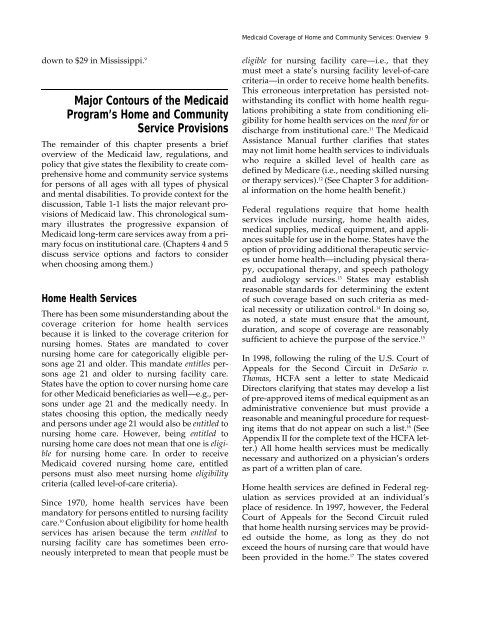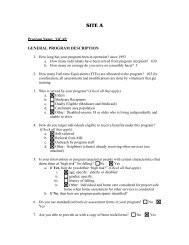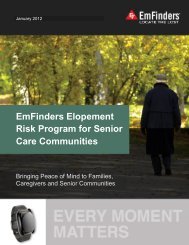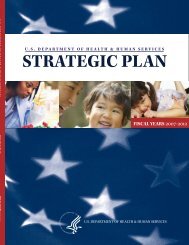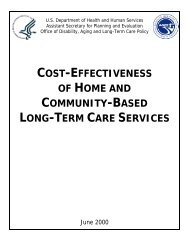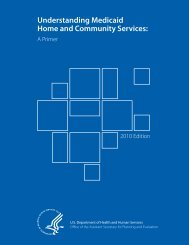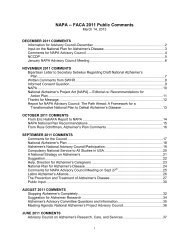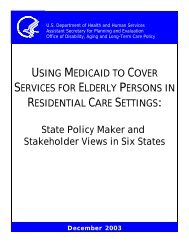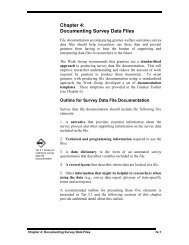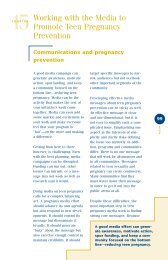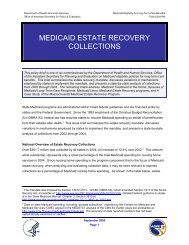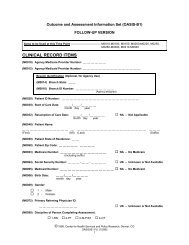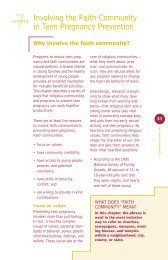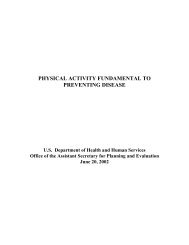Full PDF Version - ASPE - U.S. Department of Health and Human ...
Full PDF Version - ASPE - U.S. Department of Health and Human ...
Full PDF Version - ASPE - U.S. Department of Health and Human ...
- No tags were found...
You also want an ePaper? Increase the reach of your titles
YUMPU automatically turns print PDFs into web optimized ePapers that Google loves.
Medicaid Coverage <strong>of</strong> Home <strong>and</strong> Community Services: Overview 9down to $29 in Mississippi. 9Major Contours <strong>of</strong> the MedicaidProgram’s Home <strong>and</strong> CommunityService ProvisionsThe remainder <strong>of</strong> this chapter presents a briefoverview <strong>of</strong> the Medicaid law, regulations, <strong>and</strong>policy that give states the flexibility to create comprehensivehome <strong>and</strong> community service systemsfor persons <strong>of</strong> all ages with all types <strong>of</strong> physical<strong>and</strong> mental disabilities. To provide context for thediscussion, Table 1-1 lists the major relevant provisions<strong>of</strong> Medicaid law. This chronological summaryillustrates the progressive expansion <strong>of</strong>Medicaid long-term care services away from a primaryfocus on institutional care. (Chapters 4 <strong>and</strong> 5discuss service options <strong>and</strong> factors to considerwhen choosing among them.)Home <strong>Health</strong> ServicesThere has been some misunderst<strong>and</strong>ing about thecoverage criterion for home health servicesbecause it is linked to the coverage criterion fornursing homes. States are m<strong>and</strong>ated to covernursing home care for categorically eligible personsage 21 <strong>and</strong> older. This m<strong>and</strong>ate entitles personsage 21 <strong>and</strong> older to nursing facility care.States have the option to cover nursing home carefor other Medicaid beneficiaries as well—e.g., personsunder age 21 <strong>and</strong> the medically needy. Instates choosing this option, the medically needy<strong>and</strong> persons under age 21 would also be entitled tonursing home care. However, being entitled tonursing home care does not mean that one is eligiblefor nursing home care. In order to receiveMedicaid covered nursing home care, entitledpersons must also meet nursing home eligibilitycriteria (called level-<strong>of</strong>-care criteria).Since 1970, home health services have beenm<strong>and</strong>atory for persons entitled to nursing facilitycare. 10 Confusion about eligibility for home healthservices has arisen because the term entitled tonursing facility care has sometimes been erroneouslyinterpreted to mean that people must beeligible for nursing facility care—i.e., that theymust meet a state’s nursing facility level-<strong>of</strong>-carecriteria—in order to receive home health benefits.This erroneous interpretation has persisted notwithst<strong>and</strong>ingits conflict with home health regulationsprohibiting a state from conditioning eligibilityfor home health services on the need for ordischarge from institutional care. 11 The MedicaidAssistance Manual further clarifies that statesmay not limit home health services to individualswho require a skilled level <strong>of</strong> health care asdefined by Medicare (i.e., needing skilled nursingor therapy services). 12 (See Chapter 3 for additionalinformation on the home health benefit.)Federal regulations require that home healthservices include nursing, home health aides,medical supplies, medical equipment, <strong>and</strong> appliancessuitable for use in the home. States have theoption <strong>of</strong> providing additional therapeutic servicesunder home health—including physical therapy,occupational therapy, <strong>and</strong> speech pathology<strong>and</strong> audiology services. 13 States may establishreasonable st<strong>and</strong>ards for determining the extent<strong>of</strong> such coverage based on such criteria as medicalnecessity or utilization control. 14 In doing so,as noted, a state must ensure that the amount,duration, <strong>and</strong> scope <strong>of</strong> coverage are reasonablysufficient to achieve the purpose <strong>of</strong> the service. 15In 1998, following the ruling <strong>of</strong> the U.S. Court <strong>of</strong>Appeals for the Second Circuit in DeSario v.Thomas, HCFA sent a letter to state MedicaidDirectors clarifying that states may develop a list<strong>of</strong> pre-approved items <strong>of</strong> medical equipment as anadministrative convenience but must provide areasonable <strong>and</strong> meaningful procedure for requestingitems that do not appear on such a list. 16 (SeeAppendix II for the complete text <strong>of</strong> the HCFA letter.)All home health services must be medicallynecessary <strong>and</strong> authorized on a physician’s ordersas part <strong>of</strong> a written plan <strong>of</strong> care.Home health services are defined in Federal regulationas services provided at an individual’splace <strong>of</strong> residence. In 1997, however, the FederalCourt <strong>of</strong> Appeals for the Second Circuit ruledthat home health nursing services may be providedoutside the home, as long as they do notexceed the hours <strong>of</strong> nursing care that would havebeen provided in the home. 17 The states covered


